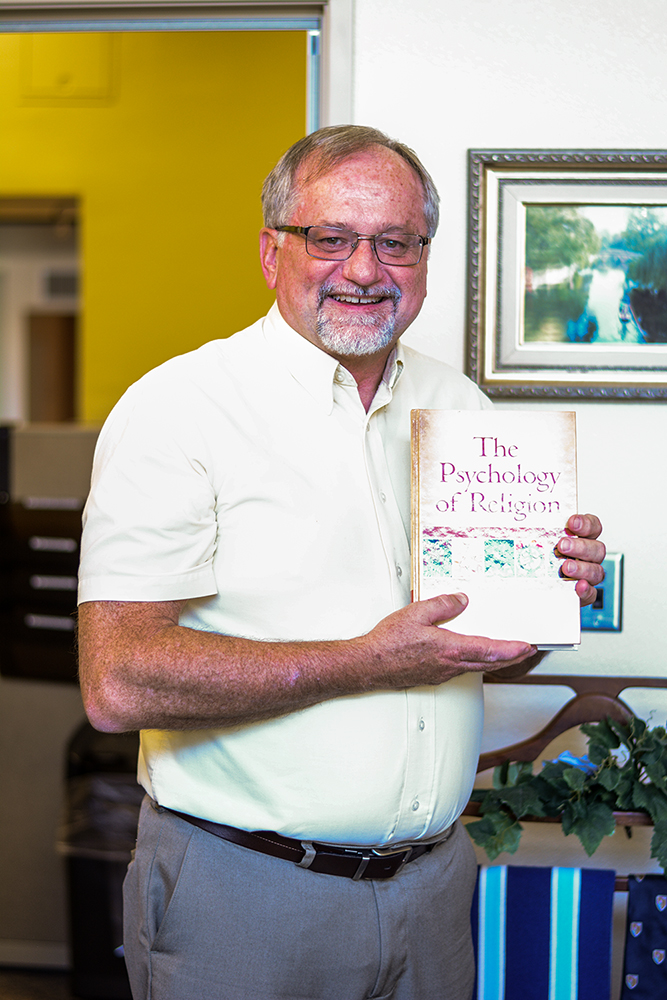Social psychology, as Hill describes it, is an unusual mix between psychology and sociology. His chosen field and educational background center around the study of people and how they interact with others, along with the study of why they behave the way they do in the first place.
Integration with Christianity is also a cornerstone for Hill, leading him to teach his classes with strict intention and considering the humanity of Jesus as well as the psychology of humility. Having been the undergraduate psychology chair for 15 years, Biola drew Hill in due to its Christian worldview and earnest teaching of the Bible. His perspective on life in general, people and faith interplay beautifully — they are even obligated to connect.
What is your educational background, and why did you choose it?
“I’ve got a Ph.D. in social psychology. So everybody, when they think of psychology, they think of clinical psych — working with people, people with problems all that. I don’t do any clinical work. Our graduate program is a clinical program, but I’m a social psychologist, which is kind of a hybrid between psychology and sociology. My own training is probably more in psychology than it is sociology. And even now, you’ve probably formed first impressions of me, good or bad. [laughs].”
Psychologists get a bad reputation in society, why do you think that is? How do people react to learning you teach psychology at a collegiate level?
“When you’re at a party and you’re introducing yourself you don’t really know people and they’re like, ‘You’re a psychologist?’ And immediately they almost always take a step back, like suddenly they’re under [scrutiny]. And my response is, I don’t think we’re intentionally doing that. It’s sort of like the mechanic. The mechanic is probably not always thinking what’s under the hood of the car. Sometimes he or she is just driving the car, and they’re not thinking about it… Social psych is more with what people think about, how they relate to each other — small group functioning, committee kinds of things.”
What does Christian integration mean to you?
“I take seriously the notion of integration with Christian thinking. I’ve sensed all the way along that our department does. A lot of psych departments at other schools, Christian schools, they often have a kind of capstone course that’s kind of your integration course. Like, ‘You’ve learned your field now, you’ve learned some Bible classes, now let’s put them together.’ So the BBST integration seminar is often that philosophy, and that’s great. But we actually have a ‘Psych and Christian Thought’ class that we encourage students to take right after general psych. Right after their intro course, up front… We do that because we want them to start thinking that way. I want them to start realizing: what are the issues we are facing in our field as Christians?”
How is your personal theology affected by your field of study? Have you ever thought of the incarnate Jesus through a psychological lens?
“I really do think psychology can help our theology. It’s not a one-way street. Our theology informs our psychology, but I think our psychology can inform our theology as well… If Jesus were to take a personality test, what would he get? [laughs]. So even some of the personality characteristics, so I told you earlier I’m interested in the topic of humility. We can look at Philippians chapter two where Christ, it says, humbled himself and became obedient unto death, even death onto a cross. Really, what does that mean? How does that get translated into our world today? Certainly, it’s humility towards God, we don’t consider ourselves equal with God, yes, but how does that even influence how we relate to each other? How do faculty relate to students, how do students relate to faculty? I think the study of Jesus’ life and some of the parables — the parable of the good samaritan, that’s telling you who your neighbor is, so why do we have problems sometimes with people who are of different culture than us, who don’t think like we do? So that’s how I would look at Jesus psychologically.”







